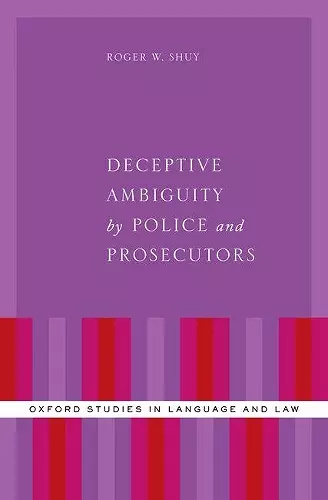Deceptive Ambiguity by Police and Prosecutors
Format:Hardback
Publisher:Oxford University Press Inc
Published:26th Oct '17
Currently unavailable, and unfortunately no date known when it will be back

Much has been written about how criminal suspects, defendants, and the targets of undercover operations employ ambiguous language as they interact with the legal system. This book examines the other side of the coin, describing fifteen criminal investigations that demonstrate how police, prosecutors, and undercover agents use deceptive ambiguity with their subjects and targets, thereby creating misrepresentations through their uses of speech events, schemas, agendas, speech acts, lexicon, and grammar. This misrepresentation also can strongly affect the perceptions of later listeners, such as judges and juries, about the subjects' motives, predispositions, intentions, and voluntariness. Deception is commonly considered intentional while ambiguity is often excused as unintentional, in line with Grice's maxim of sincerity in his cooperative principle. Most of the interactions of suspects, defendants, and targets with representatives of law enforcement, however, are oppositional, adversarial, and non-cooperative events that provide the opportunity for participants to stretch, ignore, or even violate the cooperative principle. One effective way law enforcement does this is by using ambiguity. Suspects and defendants may hear such ambiguous speech and not recognize the ambiguity and therefore react in ways that they may not have understood or intended. The fifteen case studies in this book illustrate how deceptive ambiguity, whether intentional or not, is used as commonly by police, prosecutors and undercover agents as it is by suspects and defendants.
"In Deceptive Ambiguity, Dr. Roger Shuy, founder and doyen of Forensic Linguistics in the US, once more reveals his genius for explaining the linguistics of real-world situations. Deception is a much-discussed area of the field, and one he has written on repeatedly throughout the years. But here Shuy's focus is specifically on how those who have control of the communicative situation can and do use ambiguity to deceive. He demonstrates-through detailed analyses of case after case that he himself consulted on-how manipulation can be effected beneath the surface of conversational participants' conscious awareness. In this highly accessible text, Dr. Shuy demonstrates that in the legal arena, such use of deceptive ambiguity can be the equal province of lawyers, prosecutors, and police, and not just the far more studied deceptive suspects."-Robert A. Leonard, Director, Graduate Program in Forensic Linguistics, Hofstra University "Roger Shuy never seems to run out of original ideas. In this latest book, he brings his learning, experience, and insight to bear to illuminate a subtle but significant new topic in language and law: the calculated use of ambiguity in law enforcement's exercise of power. As always, Shuy's blend of sophisticated linguistic analysis and clarity of expression will appeal to both professional and lay audiences."-John Conley, William Rand Kenan Jr. Professor of Law, University of North Carolina School of Law "In this book, Roger Shuy, the dean of American forensic linguistics, advances our understanding of ambiguity in legal arenas beyond written texts to speech, and our understanding of deception beyond defensive talk to its institutional exploitation through ambiguity. His case studies demonstrate how commonplace 'deceptive ambiguity' is in pursuit of a desired goal in police interrogation, courtroom examination, and undercover sting operations. His analysis of institutionalized ambiguity should awaken legal scholars and policy makers to the contradictions inherent in the interactional patterns ordinary citizens bring to the genres of civic institutions."-Edward Finegan, Professor Emeritus of Linguistics and Law, USC Gould School of Law
ISBN: 9780190669898
Dimensions: 236mm x 157mm x 28mm
Weight: 358g
270 pages